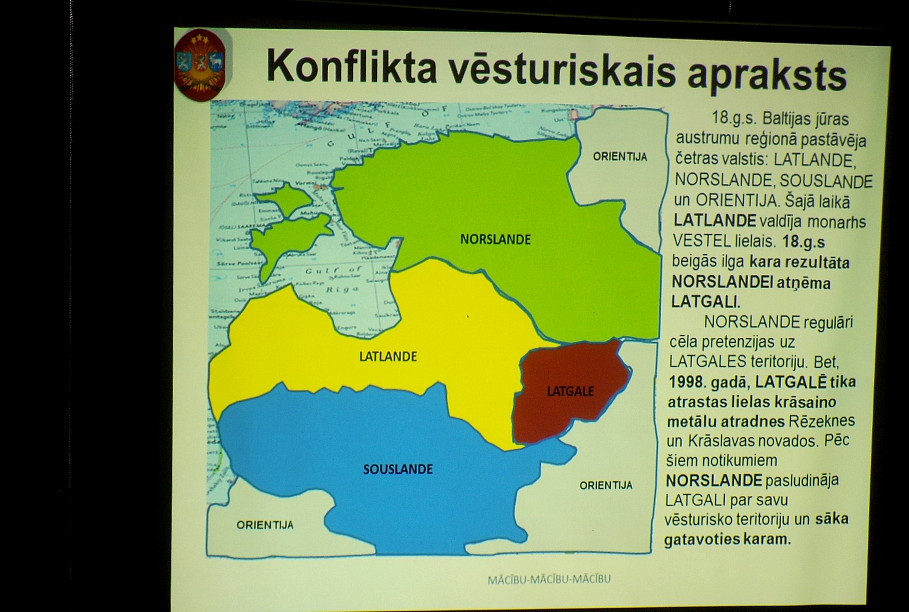Whether it's a political campaign, a referendum, an assessment of progress made in an important task or simply noting the repetition of something seen before in our history, getting over-emotional and hyperbolic about it has become as tedious as it is expected.
It's the tendency of exaggeration and sensation that is behind the "fake news" phenomenon (which might as justifiably be called the "fake drama" phenomenon as it relies upon the principles of stereotypical storytelling more than journalism) and it is also the principle behind instant comparisons of any demagogue with Hitler, and any process of social change as genocide.
All these phenomena can currently be viewed in Latvia and the other Baltic states, but the newest example of unjustified sensation repeated as fact is the one by which the Baltic states are "terrified" of Russia.
A state of terror is one in which you shiver with abject fear, in which your mind is more of less incapable of coherent thought and in which your chief impulse is to run away.
Therefore the comments in the New York Times of the Pentagon's General Raymond T Thomas that the Baltic states are "scared to death of Russia" and "desperate" for US leadership do not paint a very flattering picture of the local populations' martial spirit.
It suggests no-one knows what to do. It suggests helplessness and it suggests there is no-one among more than 6 million people capable of offering independent leadership. This is quite patronizing language.
I'd like to think General Thomas was perhaps being selectively quoted or that he was simply trying to please the interviewer, but such comments only add to the lazy assumption that the Baltic states are dysfunctional minnows, unable to manage their affairs without help from the big boys, barely real states at all... a line of thought which leads in a very unpleasant an wholly unfair direction.
The Baltic states are not "terrified" and they are not "desperate".
That's not to say they are completely carefree as far as Russia goes. Hundreds of years of precedent and the contemporary examples of Ukraine and Georgia provide more than enough material to establish that living next to Russia is cause for perpetual concern - and that is the most accurate word to describe the feeling here: concern. Concern is something sober, serious and fundamentally rational.
This concern is nothing new. It has been around ever since Latvia, Estonia and Lithuania have existed and, arguably, even before they existed. Concerns need to be addressed and that is what is happening, with all three countries increasing their defense spending, increasing the size and effectiveness of their forces and increasing their commitment to their allies within NATO just as their allies are expected to increase their commitments in the other direction.
Concern has very little in common with "terror" other than an acknowledgment that a threat is present. Concern has even less in common with sensationalized news, which doesn't really care about the nature of the threat, just so long as it can be used to play the emotions high up the scale.
Again, the comparison with formulaic drama is more appropriate than a comparison with news. The audience must have the sense of tension cranked up by degrees until that satisfying (read "terrifying") pitch is reached when dramatic structure dictates the climax is just around the corner.
But the history of the Baltic states is not a three-act melodrama. There are hundreds of acts, all of them improvised and the performances are expected to continue not for a single season but in perpetuity. Hamming it up and chewing the scenery is not required.
In my experience one of the best ways of seeing this important difference between emotive and pragmatic ways of thinking about geopolitics is to watch media day at any army training exercise. It's the media (and sometimes politicians) who are all excited, buzzing around, putting on helmets and looking through scopes while striking a pose.
The actual military personnel are always a bit reticent, shy even. The inevitable questions about being afraid in battle generally receive a shrug and a variation on "It's my job". Perhaps a desire to please or an active desire to see one's name in print (Which gets the journalists shrugging and saying "It's my job" in turn) will bring forth something stronger - which might be what happened in General Thomas' case.
That's not to say the worlds of the thrill-seeker and the professional never overlap. There will always be a few weekend warriors who like to act like they are auditioning for a role in Commando while the vast majority of military personnel get on with improving their skill sets.
Likewise, there will also be a few desk-job officials who like to sound off on geopolitics between spreadsheets; though there are many more public servants who concentrate on making sure equipment is delivered on time and that soldiers get fed and paid on time.
And, hopefully, there will always be a few reporters who stick to basic duties - reporting - without succumbing to the editors' demand for more hackneyed emotion. In all honesty I fear for the continued existence of highly-trained and motivated reporters rather more than I do for the future of highly-trained and motivated soldiers.
































